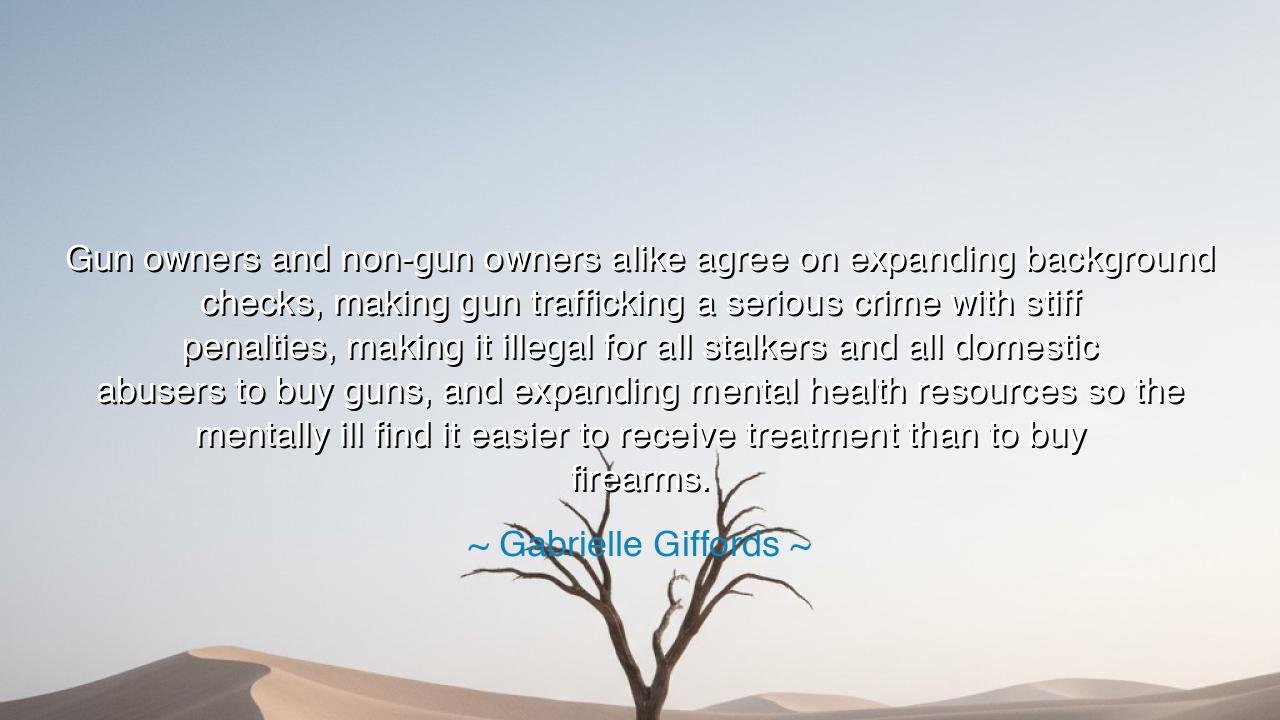
Gun owners and non-gun owners alike agree on expanding background
Gun owners and non-gun owners alike agree on expanding background checks, making gun trafficking a serious crime with stiff penalties, making it illegal for all stalkers and all domestic abusers to buy guns, and expanding mental health resources so the mentally ill find it easier to receive treatment than to buy firearms.






In the solemn voice of one who has endured violence and chosen courage, Gabrielle Giffords spoke words that rise above politics and echo through the conscience of a nation: “Gun owners and non-gun owners alike agree on expanding background checks, making gun trafficking a serious crime with stiff penalties, making it illegal for all stalkers and all domestic abusers to buy guns, and expanding mental health resources so the mentally ill find it easier to receive treatment than to buy firearms.” These are not the words of division, but of unity — a call not to arms, but to wisdom, compassion, and responsibility. Giffords, once a congresswoman and victim of gun violence herself, transforms her own suffering into a vision of justice that seeks to heal rather than wound. Her voice is both gentle and resolute, a reminder that law and morality are strongest when joined by empathy.
The origin of this quote lies in a moment of tragedy that became a testament to endurance. In January of 2011, during a public gathering in Arizona, Giffords was shot in the head by an assailant, a wound that nearly took her life. Yet from that crucible of pain was born not hatred, but a purpose that burns still. In the years that followed, she became an advocate for gun safety and reform, seeking not to divide Americans into enemies, but to unite them in the shared goal of protecting life. Her statement reflects both her understanding of human frailty and her faith in humanity’s capacity for reason. She believes, as the ancients did, that freedom without virtue decays into chaos — and that the right to bear arms must be bound by the duty to preserve life.
When Giffords speaks of “expanding background checks” and “making gun trafficking a serious crime,” she is calling for accountability in a world too often ruled by impulse and indifference. Just as a wise builder inspects the foundation before laying the walls, so too must a wise society ensure that weapons of death are not given blindly. Her plea is not against ownership, but against carelessness — a warning that power, when unguarded, becomes a danger not only to others but to the soul of the one who wields it. To demand responsibility is not tyranny; it is the highest form of respect for the right itself.
Consider the story of Solon of Athens, the great lawgiver of the ancient world. When he saw his city consumed by discord, he did not banish wealth or weapons, but instead created laws that bound freedom to justice. He taught that the strength of a people lay not in their might, but in their mutual trust — in laws that protect the weak as much as they empower the strong. Giffords’ vision follows that same ancient path: a civilization cannot endure when its instruments of defense become instruments of fear. Her proposal for “stiff penalties for traffickers” and “restrictions for abusers and stalkers” is not the voice of control, but of moral order — the ancient harmony between liberty and safety that all wise societies seek.
When she speaks of “expanding mental health resources,” her words reach deeper still. For she knows, as healers of old knew, that violence often begins in suffering unacknowledged. The broken mind, left untreated, becomes a storm that sweeps away reason and compassion. Giffords reminds us that to heal a nation, one must heal its hearts. The mentally ill, she says, must find it easier to reach for help than for harm — a truth as timeless as any written in the philosophies of Hippocrates or Confucius. To build systems that guide the wounded back to light is not mercy alone — it is civilization itself.
There is a rare nobility in her approach, for she speaks not as one seeking vengeance, but as one who has seen the edge of darkness and returned with understanding. Her plea is not born of ideology, but of lived truth: that the preservation of life is the highest law. In her words, we hear echoes of the warrior’s restraint, of the philosopher’s reason, and of the mother’s love. The balance she calls for is not weakness but wisdom — for only through restraint can power remain human.
So, O listener, take this teaching to heart. Do not treat the debate over weapons as a battlefield of pride, but as a meeting place of conscience. To honor the right to bear arms is to honor also the duty to guard life. Support laws that protect the innocent without denying dignity to the responsible. Help build a culture where empathy tempers strength, and where those in pain find healing before tragedy. Remember that the true strength of a nation lies not in its firepower, but in the compassion and courage of its people.
The lesson of Gabrielle Giffords’ words is clear and timeless: that unity is born not from silence, but from shared humanity. Whether one owns a gun or not, the duty to protect life belongs to all. Her vision is not of a world without weapons, but of a world where wisdom guides the hand that holds them. Let us, then, build such a world — where the tools of protection never become the instruments of sorrow, and where law and love together guard the fragile flame of peace.






AAdministratorAdministrator
Welcome, honored guests. Please leave a comment, we will respond soon